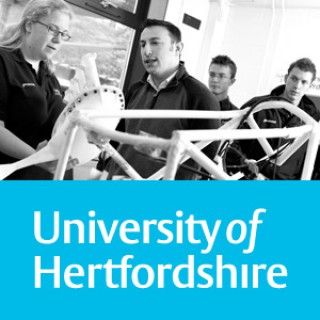
Research (Culture and Society)
Follow Research (Culture and Society)Researchers from a wide range of academic disciplines are brought together in the Social Sciences, Arts and Humanities Research Institute (SSAHRI) at the university. SSAHRI’s research units were judged to be of international quality in terms of originality, significance and rigour in the 2008 Resear…
- Feb 9, 2015 LATEST EPISODE
- infrequent NEW EPISODES
- 30m AVG DURATION
- 10 EPISODES
More podcasts from University of Hertfordshire
Latest episodes from Research (Culture and Society)

On 26 November 2014 the Creative Economy Research Centre (CERC) launched with two professorial lectures delivered by Professors Peter Richardson and Keith Randle. CERC is a multi-disciplinary centre of excellence for research, and for business and social engagement, in the creative industries and the broader creative economy. This video contains Professor Peter Richardson's talk.

Inaugural Professorial Lectures from CERC: The Stubborn Persistence of Inequalities in the UK Creative and Cultural Industries
On 26 November 2014 the Creative Economy Research Centre (CERC) launched with two professorial lectures delivered by Professors Peter Richardson and Keith Randle. CERC is a multi-disciplinary centre of excellence for research, and for business and social engagement, in the creative industries and the broader creative economy. This video contains the lecture by Professor Keith Randle.

Critical Discourse Analysis has identified a number of (fallacious) argumentation schemes that reoccur in anti-immigration discourse and which serve strategically to legitimise restrictive immigration policies. In this paper, I argue that the move from the premise to the presupposed conclusion which realises such argumentation strategies in fact reflects adapted decision rules operationalised by a so called ‘cheater-detection’ module (Cosmides 1989). On this account, assertions in anti-immigration discourse provide the necessary input to the cheater-detection module to result in decisions in favour of discriminatory policies and practices. Persuasion, or perhaps even manipulation, is then not a matter of pragmatic reasoning processes but may instead involve the exploitation of evolved cognitive programmes. I show how assertions in anti-immigration discourse activate the cheater-detection module in a critical analysis of representations of immigrants and asylum-seekers in the British right-wing press.

Philosophers, historians, economists, social scientists and creative arts practitioners gathered in March 2010 to discuss what happiness means and how a greater depth of the state can be achieved. A highlight of the conference - entitled 'Happiness – Perspectives from the Social Sciences, Humanities and Creative Arts', was a keynote on the The Art of Happiness by Professor Richard Schoch from Queen Mary, University of London.

A talk within the EL and C seminar series on an EU funded project

Tim Hitchcock: Social Sciences, Arts and Humanities Research Institute Exhibition
A podcast where Professor Tim Hitchcock is interviewed about the SSAHRI event, and the idea behind the event and the variety of work that goes on at the University of Hertfordshire

In April 2010 the university hosted 'Open Graves, Open Minds: Vampires and the Undead in Modern Culture'. This was the UK's first vampire conference. Writer Marcus Sedgwick was a keynote speaker. His novels include My Swordhand is Singing; 2006; The Kiss of Death, 2008; Revolver 2009. Dr Sam George from the university, introduces the talk.

A podcast where Professor Marty St. James is interviewed about his students' work, his own work and how others can be creative

An interview with Professor Jonathan Morris, who researched the history of Italian-styled coffees

Colin Haslam: Social Sciences, Arts and Humanities Research Institute Exhibition
A podcast with Colin Haslam, where he talks about research work that his students have been doing at SSAHRI's week-long exhibition

















